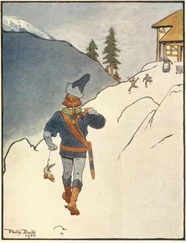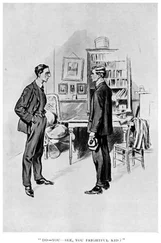Bill may have quaked inwardly as he listened to this epic but outwardly he was unmoved.
"Well," he said, "what about it?"
"What about it!" said Lucille.
"What about it!" said Archie. "Why, my dear old friend, it simply means that all the time we've been putting in making your personality winning has been chucked away. Absolutely a dead loss! We might just as well have read a manual on how to knit sweaters."
"I don't see it," maintained Bill, stoutly.
Lucille turned apologetically to her husband.
"You mustn't judge me by him, Archie, darling. This sort of thing doesn't run in the family.-We are supposed to be rather bright on the whole. But poor Bill was dropped by his nurse when he was a baby, and fell on his head."
"I suppose what you're driving at," said the goaded Bill, "is that what has happened will make father pretty sore against girls who happen to be in the chorus?"
"That's absolutely it, old thing, I'm sorry to say. The next person who mentions the word chorus-girl in the jolly old governor's presence is going to take his life in his hands. I tell you, as one man to another, that I'd much rather be back in France hopping over the top than do it myself."
"What darned nonsense! Mabel may be in the chorus, but she isn't like those girls."
"Poor old Bill!" said Lucille. "I'm awfully sorry, but it's no use not facing facts. You know perfectly well that the reputation of the hotel is the thing father cares more about than anything else in the world, and that this is going to make him furious with all the chorus-girls in creation. It's no good trying to explain to him that your Mabel is in the chorus but not of the chorus, so to speak."
"Deuced well put!" said Archie, approvingly. "You're absolutely right. A chorus-girl by the river's brim, so to speak, a simple chorus-girl is to him, as it were, and she is nothing more, if you know what I mean."
"So now," said Lucille, "having shown you that the imbecile scheme which you concocted with my poor well-meaning husband is no good at all, I will bring you words of cheer. Your own original plan—of getting your Mabel a part in a comedy—was always the best one. And you can do it. I wouldn't have broken the bad news so abruptly if I hadn't had some consolation to give you afterwards. I met Reggie van Tuyl just now, wandering about as if the cares of the world were on his shoulders, and he told me that he was putting up most of the money for a new play that's going into rehearsal right away. Reggie's an old friend of yours. All you have to do is to go to him and ask him to use his influence to get your Mabel a small part. There's sure to be a maid or something with only a line or two that won't matter."
"A ripe scheme!" said Archie. "Very sound and fruity!"
The cloud did not lift from Bill's corrugated brow.
"That's all very well," he said. "But you know what a talker Reggie is. He's an obliging sort of chump, but his tongue's fastened on at the middle and waggles at both ends. I don't want the whole of New York to know about my engagement, and have somebody spilling the news to father, before I'm ready."
"That's all right," said Lucille. "Archie can speak to him. There's no need for him to mention your name at all. He can just say there's a girl he wants to get a part for. You would do it, wouldn't you, angel-face?"
"Like a bird, queen of my soul."
"Then that's splendid. You'd better give Archie that photograph of Mabel to give to Reggie, Bill."
"Photograph?" said Bill. "Which photograph? I have twenty-four!"
Archie found Reggie van Tuyl brooding in a window of his club that looked over Fifth Avenue. Reggie was a rather melancholy young man who suffered from elephantiasis of the bank-roll and the other evils that arise from that complaint. Gentle and sentimental by nature, his sensibilities had been much wounded by contact with a sordid world; and the thing that had first endeared Archie to him was the fact that the latter, though chronically hard-up, had never made any attempt to borrow money from him. Reggie would have parted with it on demand, but it had delighted him to find that Archie seemed to take a pleasure in his society without having any ulterior motives. He was fond of Archie, and also of Lucille; and their happy marriage was a constant source of gratification to him.
For Reggie was a sentimentalist. He would have liked to live in a world of ideally united couples, himself ideally united to some charming and affectionate girl. But, as a matter of cold fact, he was a bachelor, and most of the couples he knew were veterans of several divorces. In Reggie's circle, therefore, the home-life of Archie and Lucille shone like a good deed in a naughty world. It inspired him. In moments of depression it restored his waning faith in human nature.
Consequently, when Archie, having greeted him and slipped into a chair at his side, suddenly produced from his inside pocket the photograph of an extremely pretty girl and asked him to get her a small part in the play which he was financing, he was shocked and disappointed. He was in a more than usually sentimental mood that afternoon, and had, indeed, at the moment of Archie's arrival, been dreaming wistfully of soft arms clasped snugly about his collar and the patter of little feet and all that sort of thing.-He gazed reproachfully at Archie.
"Archie!" his voice quivered with emotion. "Is it worth it?, is it worth it, old man?-Think of the poor little woman at home!"
Archie was puzzled.
"Eh, old top? Which poor little woman?"
"Think of her trust in you, her faith—".
"I don't absolutely get you, old bean."
"What would Lucille say if she knew about this?"
"Oh, she does. She knows all about it."
"Good heavens!" cried Reggie.-He was shocked to the core of his being.-One of the articles of his faith was, that the union of Lucille and Archie was different from those loose partnerships which were the custom in his world.-He had not been conscious of such a poignant feeling that the foundations of the universe were cracked and tottering and that there was no light and sweetness in life since the morning, eighteen months back, when a negligent valet had sent him out into Fifth Avenue with only one spat on.
"It was Lucille's idea," explained Archie. He was about to mention his brother-in-law's connection with the matter, but checked himself in time, remembering Bill's specific objection to having his secret revealed to Reggie. "It's like this, old thing, I've never met this female, but she's a pal of Lucille's"-he comforted his conscience by the reflection that, if she wasn't now, she would be in a few days-"and Lucille wants to do her a bit of good. She's been on the stage in England, you know, supporting a jolly old widowed mother and educating a little brother and all that kind and species of rot, you understand, and now she's coming over to America, and Lucille wants you to rally round and shove her into your show and generally keep the home fires burning and so forth. How do we go?"
Reggie beamed with relief. He felt just as he had felt on that other occasion at the moment when a taxi-cab had rolled up and enabled him to hide his spatless leg from the public gaze.
"Oh, I see!" he said. "Why, delighted, old man, quite delighted!"
"Any small part would do. Isn't there a maid or something in your bob's-worth of refined entertainment who drifts about saying, 'Yes, madam,' and all that sort of thing? Well, then that's just the thing. Topping! I knew I could rely on you, old bird. I'll get Lucille to ship her round to your address when she arrives. I fancy she's due to totter in somewhere in the next few days. Well, I must be popping. Toodle-oo!"
"Pip-pip!" said Reggie.
It was about a week later that Lucille came into the suite at the Hotel Cosmopolis that was her home, and found Archie lying on the couch, smoking a refreshing pipe after the labours of the day. It seemed to Archie that his wife was not in her usual cheerful frame of mind. He kissed her, and, having relieved her of her parasol, endeavoured without success to balance it on his chin. Having picked it up from the floor and placed it on the table, he became aware that Lucille was looking at him in a despondent sort of way. Her grey eyes were clouded.
Читать дальше


